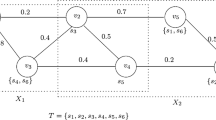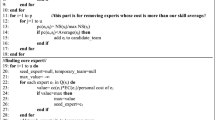Abstract
In the area of professional social networks, collaborative team formation with its NP-hard nature, has attracted the attention of many researchers. The purpose of this study is to find a collaborative team which covers required skills and minimizes the communication cost among team members. To solve this problem, BRADO (BRAin Drain Optimization), a recently-proposed meta-heuristic swarm-based algorithm which simulates the brain drain phenomenon, has been utilized. In order to evaluate BRADO, it has been applied in extensive experiments to the DBLP and IMDb datasets. Results demonstrate the effectiveness and superiority of the BRADO algorithm in comparison with PSO, GA, ICA, RarestFirst and EnhancedSteiner algorithms. Our findings lead us to believe that the BRADO algorithm can be a promising method in the context of team formation problem.











Similar content being viewed by others
References
Albert, R., Jeong, H., Barabási, A.L.: Error and attack tolerance of complex networks. Nature 406, 378–382 (2000)
Anagnostopoulos, A., Becchetti, L., Castillo, C., Gionis, A., Leonardi, S.: Online team formation in social networks Proceedings of the 21st international conference on World Wide Web, pp 839–848. ACM (2012)
Appel, A.P., Cavalcante, V.F., Vieira, M.R., de Santana, V.F., de Paula, R.A., Tsukamoto, S.K.: Building socially connected skilled teams to accomplish complex tasks Proceedings of the 8th Workshop on Social Network Mining and Analysis, p 8. ACM (2014)
Atashpaz-Gargari, E., Lucas, C.: Imperialist Competitive Algorithm: an Algorithm for Optimization Inspired by Imperialistic Competition IEEE Congress on Evolutionary Computation, 2007. CEC 2007, pp 4661–4667. IEEE (2007)
Basiri, J., Taghiyareh, F.: An Application of the Corer Classifier on Customer Churn Prediction 2012 6th International Symposium on Telecommunications (IST), pp 867–872. IEEE (2012)
Basiri, J., Taghiyareh, F.: Introducing a socio-inspired swarm intelligence algorithm for numerical function optimization 2014 4th International eConference on Computer and Knowledge Engineering (ICCKE), pp 462–467. IEEE (2014)
Basiri, J., Taghiyareh, F., Gazani, S.: Corer: a new rule generator classifier 2010 IEEE 13th International Conference on Computational Science and Engineering (CSE), pp 64–71. IEEE (2010)
Baykasoglu, A., Dereli, T., Das, S.: Project team selection using fuzzy optimization approach. Cybern. Syst. Int. J. 38, 155–185 (2007)
Beine, M., Docquier, F., Rapoport, H.: Brain drain and human capital formation in developing countries: Winners and losers*. Econ. J. 118, 631–652 (2008)
Blum, C., Roli, A.: Metaheuristics in combinatorial optimization: Overview and conceptual comparison. ACM Comput. Surv. (CSUR) 35, 268–308 (2003)
Caseau, Y., Guillo, P.Y., Levenez, E.: A deductive and object-oriented approach to a complex scheduling problem. J. Intell. Inf. Syst. 4, 149–166 (1995)
Dorn, C., Dustdar, S.: Composing near-optimal expert teams: a trade-off between skills and connectivity OTM Confederated International Conferences “On the Move to Meaningful Internet Systems”, pp 472–489. Springer (2010)
Easley, D., Kleinberg, J.: Networks, crowds, and markets: Reasoning about a highly connected world. Cambridge University Press (2010)
Erd6s, P., Rényi, A.: On the evolution of random graphs. Publ. Math. Inst. Hungar. Acad. Sci 5, 17–61 (1960)
Fitzpatrick, E.L., Askin, R.G.: Forming effective worker teams with multi-functional skill requirements. Comput. Ind. Eng. 48, 593–608 (2005)
Gajewar, A., Sarma, A.D.: Multi-skill collaborative teams based on densest subgraphs SDM, pp 165–176. SIAM (2012)
Haupt, R.L., Haupt, S.E.: Practical genetic algorithms. Wiley (2004)
Kargar, M., An, A.: Discovering top-k teams of experts with/without a leader in social networks Proceedings of the 20th ACM international conference on Information and knowledge management, pp 985–994. ACM (2011)
Kargar, M., An, A., Zihayat, M.: Efficient bi-objective team formation in social networks Joint european conference on machine learning and knowledge discovery in databases, pp 483–498. Springer (2012)
Kargar, M., Zihayat, M., An, A.: Finding affordable and collaborative teams from a network of experts Proceedings of the SIAM international conference on data mining (SDM), pp 587–595. SIAM (2013)
Kargar, M., Zihayat, M., An, A.: Finding affordable and collaborative teams from a network of experts The 2013 SIAM International Conference on Data Mining (SDM’13), pp 587–595. SIAM (2013)
Lappas, T., Liu, K., Terzi, E.: Finding a team of experts in social networks Proceedings of the 15th ACM SIGKDD international conference on Knowledge discovery and data mining, pp 467–476. ACM (2009)
Lappas, T., Liu, K., Terzi, E.: A survey of algorithms and systems for expert location in social networks Social network data analytics, pp 215–241. Springer (2011)
Li, C.-T., Shan, M.-K., Lin, S.-D.: On team formation with expertise query in collaborative social networks. Knowl. Inf. Syst. 42, 441–463 (2015)
Majumder, A., Datta, S., Naidu, K.: Capacitated team formation problem on social networks Proceedings of the 18th ACM SIGKDD international conference on knowledge discovery and data mining, pp 1005–1013. ACM (2012)
Pashaei, K., Taghiyareh, F., Badie, K.: A recursive genetic framework for evolutionary decision-making in problems with high dynamism. Int. J. Syst. Sci. 1–17 (2014)
Salehi, S., Taghiyareh, F.: Decision making improvement in social marketing strategy through dependent multi-dimensional opinion formation 2014 4th International eConference on Computer and Knowledge Engineering (ICCKE), pp 111–116. IEEE (2014)
Salman, A., Ahmad, I., Al-Madani, S.: Particle swarm optimization for task assignment problem. Microprocess. Microsyst. 26, 363–371 (2002)
Sedighizadeh, D., Masehian, E.: Particle swarm optimization methods, taxonomy and applications. Int. J. Comput. Theory Eng. 1, 486–502 (2009)
Song, S.: Design of distributed database systems: an iterative genetic algorithm. J. Intell. Inf. Syst. 1–31 (2013)
Talbi, E.G.: Metaheuristics: from design to implementation, vol. 74. Wiley (2009)
Wang, X., Zhao, Z., Ng, W.: A comparative study of team formation in social networks International conference on database systems for advanced applications, pp 389–404. Springer (2015)
Wi, H., Oh, S., Mun, J., Jung, M.: A team formation model based on knowledge and collaboration. Expert Syst. Appl. 36, 9121–9134 (2009)
Wu, L., Wu, X., Lu, A., Zhou, Z.H.: A spectral approach to detecting subtle anoMalies in graphs. J. Intell. Inf. Syst. 41, 313–337 (2013)
Yin, H., Cui, B., Huang, Y.: Finding a wise group of experts in social networks Advanced Data Mining and Applications, pp 381–394. Springer (2011)
Yin, H., Cui, B., Huang, Y.: Finding a wise group of experts in social networks International Conference on Advanced Data Mining and Applications, pp 381–394. Springer (2011)
Author information
Authors and Affiliations
Corresponding author
Rights and permissions
About this article
Cite this article
Basiri, J., Taghiyareh, F. & Ghorbani, A. Collaborative team formation using brain drain optimization: a practical and effective solution. World Wide Web 20, 1385–1407 (2017). https://doi.org/10.1007/s11280-017-0440-6
Received:
Revised:
Accepted:
Published:
Issue Date:
DOI: https://doi.org/10.1007/s11280-017-0440-6




